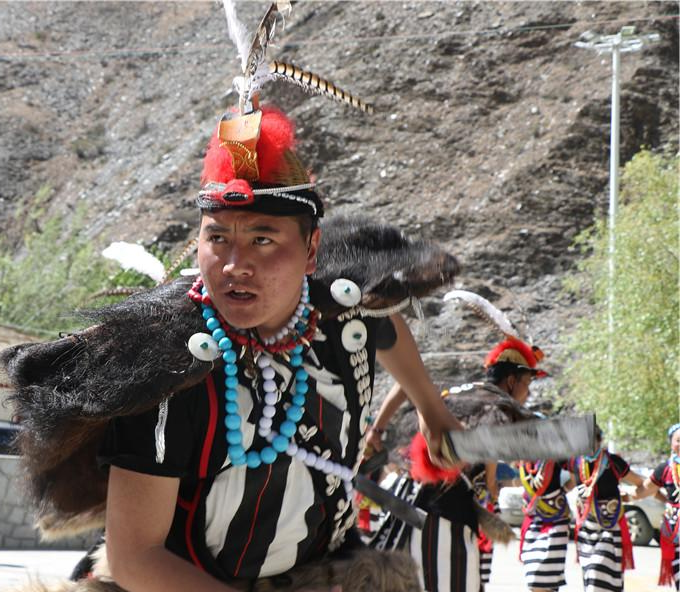Overview
Chinese Name: 珞巴族
English Name: The Lhoba nationality
Languages: Lhoba language 珞巴语, Chinese 汉语
Total population: 3.68*103 (China mainland 2022)
Distribution: Mainly distributed in southeastern Tibet

Brief introduction
The Lhoba nationality 珞巴族 is one of the ethnic minorities in China. They mainly distributed in southeastern Tibet including Mainling 米林县, Medog 墨脱县 and Zayü county 察隅县of Nyingchi 林芝市and Lhünzê County 隆子县 of Shannan, Tibet 山南市, mainly engaged in agriculture and hunting. The Lhoba people have their own language and basically use Tibetan script 藏文, and the Lhoba language belongs to the the Sino-Tibetan language family 汉藏语系. The Lhoba people continue their cultural traditions by relying on the oral legends passed down from generation to generation.

The history of the Lhoba nationality
Since ancient times, the ancestors of the Lhoba people have lived in this area, and together with the ancestors of the Tibetan people and the Monba people, they created the ancient civilization in the Himalayas. Since the Lhoba has no documentary records about the history of its own ethnic group, the origin of the Lhoba can only be explored from the rich ethnic legends of various tribes in the Himalayas. A more representative view holds that the Lhoba people probably originated from one or several ancient groups in the southeastern Qinghai-Tibet Plateau.
The religion of the Lhoba nationality
The traditional production methods and lifestyles of the Lhoba are the realistic soil for nurturing and giving birth to the primitive religious beliefs of the Lhoba. The Monba people believe in primitive religious beliefs, and because of the differences in the production environment and unbalanced development of the clans and tribes, the value orientations are also different, and they have complex and diverse characteristics.
The Cultures of the Lhoba nationality
The costumes of the Lhoba nationality 珞巴族的服饰
The costumes of the Lhoba people vary from region to region, but they are very distinctive. In the long-term development process, the Lhoba people have formed an aesthetic concept of praise and praise for strength and bravery, which is prominently displayed in their clothing.
Especially the waist ornaments and eardrums are very particular. The waist ornaments are made of animal skins, the surface of the bag is decorated with seashells, and the waist is also worn with accessories such as chains, beads, snuff bottles, and seals. Lhoba women like to wear linen woven shirts with collarless and narrow sleeves, with a piece of calfskin on the outside, and a tight tube skirt with skirt that goes past the knees.

They attach great importance to wearing ornaments. In addition to silver and copper bracelets and rings, there are dozens of circles of blue and white bead necklaces, and many round balls made of sea shells are adorned on their waist clothes. The ornaments on Lhoba women weigh several kilograms and can fill a small bamboo basket. These ornaments are exchanged by each family for many years and are a symbol of family wealth.
Men’s clothing fully shows the characteristics of mountain hunting life. Most of them wear black fleece vests woven from wool that reach the abdomen. A piece of bison hide is draped over the back and tied around the shoulders with leather straps. When men usually go out, they carry bows and arrows on their backs and waist knives on their shoulders. The tall body is matched with other shiny decorations, which makes them look extraordinarily powerful and handsome.
The diet of the Lhoba nationality 珞巴族的饮食
The Lhoba people’s living customs are deeply influenced by the Tibetans, and their daily diet and food preparation methods are basically the same as those in the Tibetan agricultural areas. The Lhoba people like to eat barbecued meat, dried meat, milk residue, and buckwheat cakes. Vegetables include cabbage, rapeseed, pumpkin, and potatoes.

Generally addicted to alcohol, in addition to drinking highland barley wine, also often drink corn wine. The Lhoba hunters are generally used to preparing poison from wild plants and applying them to arrows to shoot wild beasts. Most of the hunting activities are carried out collectively, and the wild animals caught are equally divided.
The architecture of the Lhoba nationality 珞巴族的建筑
The traditional housing of the Lhoba is the stone and wood structure, which is durable and has a good defensive function. On the door or on the walls of the house, they painted many patterns of warding off evil spirits and seeking blessings. The animal heads hanging on the wall are not only a symbol of wealth but also a show of the hunting ability of hunters.

Because the Lhoba people live in the mountains and the water flows fast, Lhoba people have created a variety of unique bridge-building techniques. Among them, the rattan network bridge is the most distinctive, and it can best show the bridge-building skills of the Lhoba people.

A Rattan network bridge is a tubular suspended network bridge made of rattan. The bridge is generally tens of meters above the water surface, and the length is as short as 50 to 60 meters, and as long as 200 to 300 meters. The bridge reflects the superb bridge-building art of the Lhoba people.